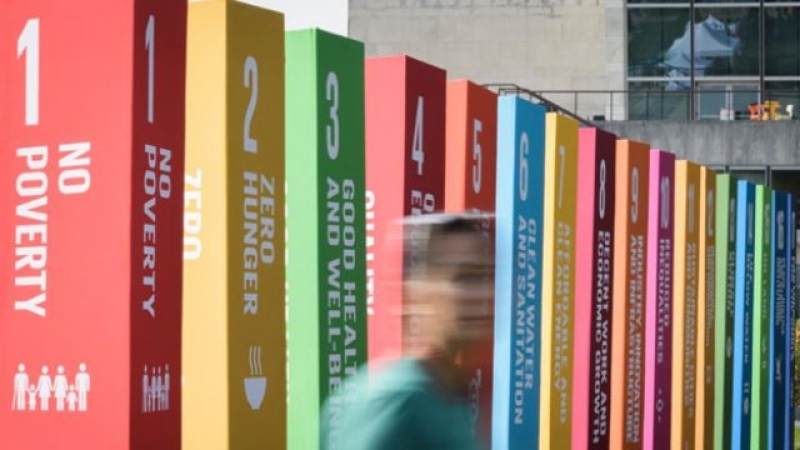- India Sees 9% Drop in Foreign Tourists as Bangladesh Visits Plunge |
- Dhaka Urges Restraint in Pakistan-Afghan War |
- Guterres Urges Action on Safe Migration Pact |
- OpenAI Raises $110B in Amazon-Led Funding |
- Puppet show enchants Children as Boi Mela comes alive on day 2 |
Is it Time to Say RIP to the SDGs?

With the multilateral system fracturing more by the day, is it time to declare the Sustainable Development Goals dead. Credit- UN Photo-Manuel Elías
By Felix Dodds and Chris Spence
SAN FRANCICO, California / APEX, North Carolina , Apr 15 2025 (IPS) - Is it only a decade since the Sustainable Development Goals (SDGs) and the Paris Agreement on climate change were agreed? The two deals were inked to a groundswell of hope.
The world had come together and reached consensus on how to tackle some of the world’s biggest challenges. A collaborative spirit was in the air.
Fast forward ten years and it feels like a century has passed and we’ve fallen over the abyss into
an alternate reality.
When he was elected for a second term, President Donald Trump promised extraordinary, history-making change. Whether you support his world view or not, no one can deny he has been true to his word. The previous multilateral consensus is shattered.
With tit-for-tat tariff escalation, cuts in overseas aid, a rise in regionalism and the return of transactional, ‘might makes right’ geopolitics, everything has changed. The old, postwar international order is fading.
Even before the dramatic changes of the past few months, the SDGs were on life support. A UN report issued in June 2024—five months before President Trump’s decisive election victory—found only 17% of the SDGs were on track.
About half showed minimal or modest progress, while one-third were actually going backwards. As we enter a new era set to be dominated by a handful of major powers and zero-sum game competition, is it time to declare the SDGs dead?
Is there a doctor in the building?
The SDGs may be ailing—their pulse faint and erratic—but in our opinion it’s not too late to save them. The goals still enjoy almost universal support among UN members. What’s more, most governments still believe in multilateralism.
They recognize that humanity’s progress throughout history has happened when people work together to create mutually beneficial win-win scenarios, not when a ‘winner-takes-all’ mentality prevails. And institutions like the United Nations haven’t gone away; their capacities and convening power remain.
Furthermore, the world is better placed today to take on many of the challenges targeted by the SDGs than it was ten years ago. For a start, new digital technologies and AI could improve access to real-time data and diagnostics, thus helping decision making. More broadly, breakthroughs in science and research—whether they relate to energy use or education, healthcare or agriculture—could prove transformative.
What’s more, the world is far wealthier than it was a decade ago. In spite of the COVID-19 pandemic, global GDP jumped from around US$85 trillion in 2015 to more than $115 trillion today; an incredible change in such a short space of time.
This means we have a greater financial capacity to fund change. In light of these transformations, international collaboration and innovation could undoubtedly help put more of the SDGs within reach.
For those who believe in collaboration over competition, the upcoming UN High-Level Political Forum (HLPF) offers an opportunity to demonstrate their mindset and commitment. The HLPF, which is taking place at UN Headquarters in New York from July 14-23, will assess progress across five of the seventeen SDGs.
This time around, it will look at health and wellbeing (SDG 3), gender equality and empowerment (SDG 5), sustainable economic growth and employment (8), oceans and marine resources (14), and the Global Partnership for Sustainable Development (17).
The theme in 2025 could not be more appropriate: advancing science and evidence-based solutions.
In recent years, there has been a backlash against experts and even a rejection of science in some quarters. The HLPF provides a timely opportunity for governments and other stakeholders to reaffirm their commitment to science and research-based decision making as the only logical, common-sense path to achieve the promise of the SDGs.
At the HLPF, 37 countries will be asked to present their national reports on the SDGs. From Bangladesh to Bulgaria, India to Indonesia, South Africa to Saint Lucia, more than three dozen countries, large and small, will have the chance to make their views clear to the world.
One of the countries that will be presenting is Germany, which will hold the Presidency of the General Assembly from September 2025 to September 2026. At such a critical time, it is reassuring that we will have leadership from a country that has been such a staunch supporter of multilateralism.
With five years to go to the SDGs’ 2030 deadline, we believe it’s time to double down on the promise of the SDGs and commit to a pathway focused on science, technology, innovation and collaboration.
Prof. Felix Dodds and Chris Spence have participated in UN environmental negotiations since the 1990s. They co-edited Heroes of Environmental Diplomacy: Profiles in Courage (Routledge, 2022). Their next book, Environmental Lobbying at the United Nations: A Guide to Protecting Our Planet, is scheduled for release in June 2025.
IPS UN Bureau

